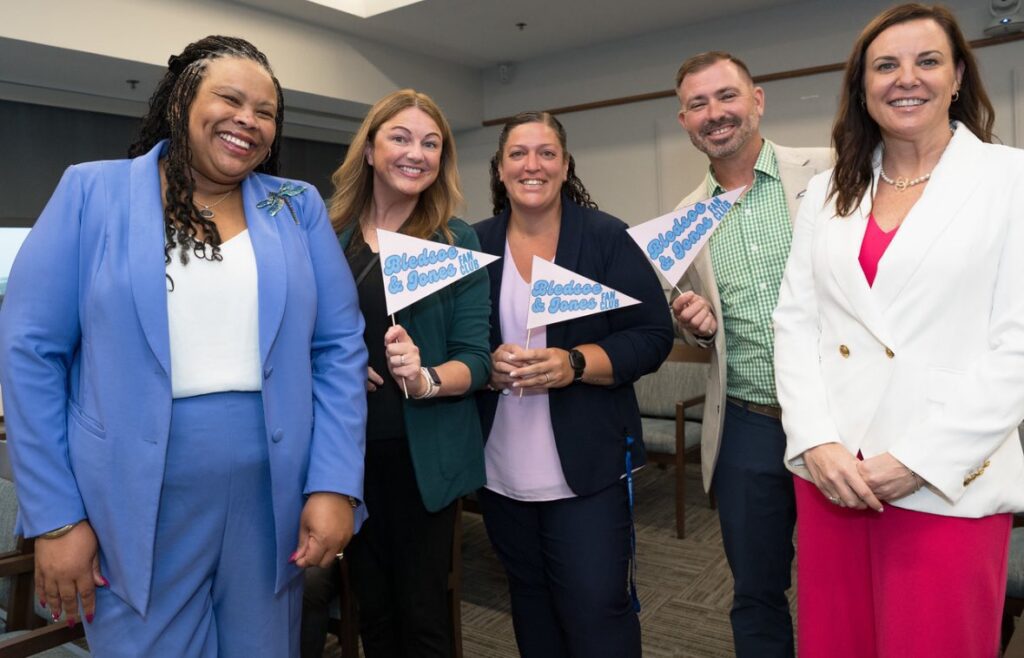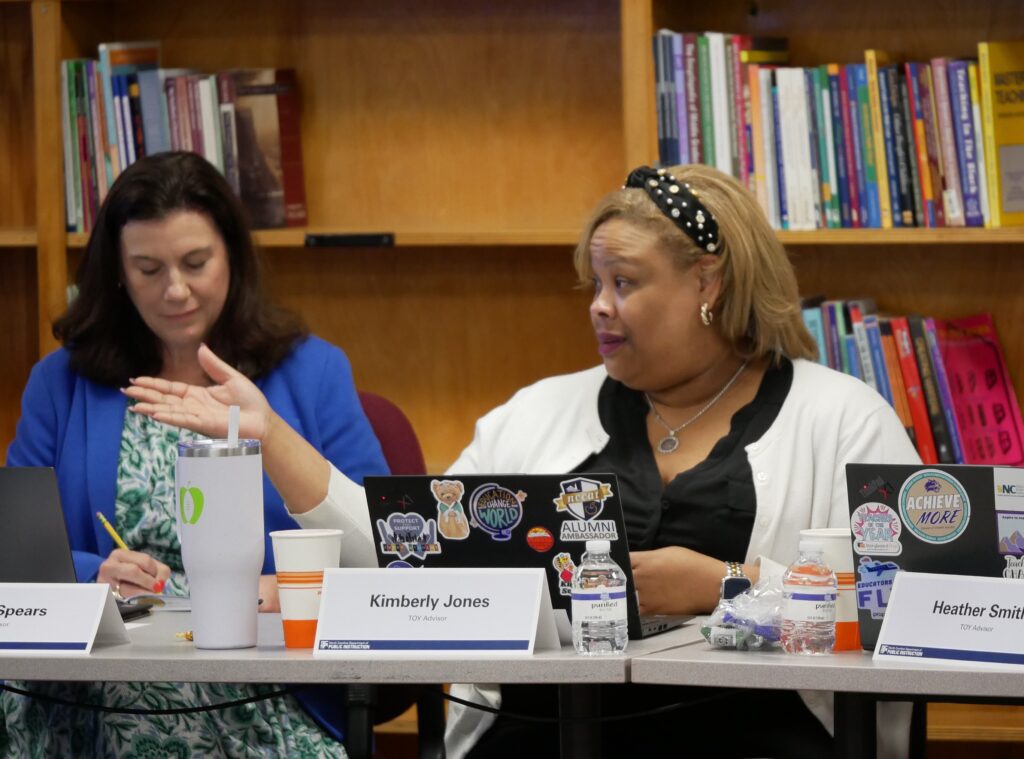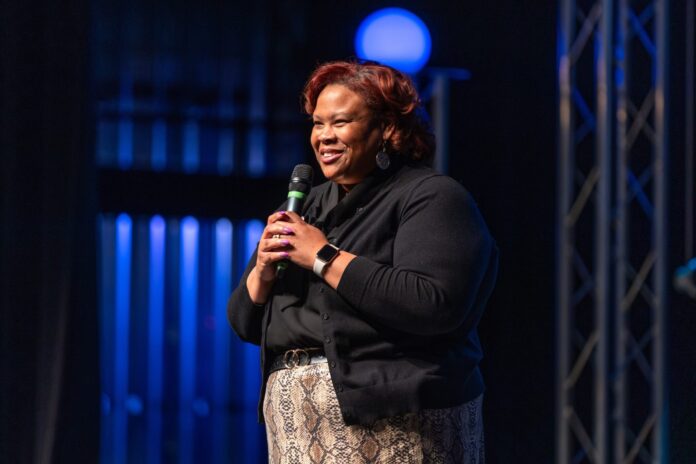Editor’s Note: Kimberly Jones served on the North Carolina State Board of Education in her capacity as the 2023 Burroughs Wellcome Fund North Carolina Teacher of the Year. This is an edited version of her remarks at the end of her tenure on the Board, delivered at her last meeting on June 5, 2025.
Good morning, Chair Davis, Superintendent Green, members of the Board, and my amazing fellow advisors.
I speak today, my final time as an advisor to this Board, as someone who has spent my entire life in North Carolina’s public school classrooms — whether as a student or an educator — I have been blessed to learn, to listen, and to put my own hands to the plow to build the kind of public schools our students need and deserve.
My commitment to North Carolina public education runs soul deep. I grew up in a working-class family in Erwin, North Carolina, a rural mill town. And my family, like so many other working-class families across our state, couldn’t afford formal preschool education. So, my earliest lessons were taught at home by my mother on our front porch.
These experiences planted in me an understanding I carry to this day. Knowledge expands our worlds. It shapes and sharpens our voices, and it empowers us to make change.
Sign up for the EdDaily to start each weekday with the top education news.
That belief guides me every day. As a high school English and AP African American Studies and Holocaust Educator, I teach students the skills to analyze literature and history, but also how to interrogate the world around them. We explore not just what was said or written or even what happened, but why it mattered. And what we must do now. Because I believe the past does not have to be a prologue, I believe education done right equips our students to create a more just future for themselves and others. It gives them not only the skills to seek the truth, but the responsibility to do something with it.
In my classroom, inquiry is not a nuisance. It is the engine of learning. We use complex questions to fuel reading, research, and rigorous dialogue, to build empathy, and to strengthen civic understanding. And I believe students of every background and every region of our state deserve access to such curricula. Ones that affirm their identity, reflect their communities, and inspire their best efforts, and invite them into meaningful conversations about the world they are inheriting and shaping.
Let me be clear. I still believe deeply and unshakably in the power, purpose, and longevity of public education in North Carolina. I believe because I have seen students thrive when they are challenged and supported. I believe because I have worked alongside educators who lead with brilliance and courage, even in the face of structural underinvestment and political hostility. And I believe because I know our state’s history. We have been trailblazers of educational progress before. And if we are truly to be rather than to seem, we must be again.
As long as educational outcomes can be predicted by or correlated to zip codes, ethnic backgrounds, or socioeconomic status, our work — your work — remains. Whether a student boards a school bus in front of a trailer park down east, at the end of a dirt road in the mountains of our state, or is brought to school by parents from the cul-de-sac in a gated subdivision in the Triangle, they all deserve our diligent best efforts and our unwavering commitment.

Our students are the message we send to a future we will never see. They reflect the values, the beliefs, and the priorities of this day and this time. Therefore, we must constantly ask ourselves, what message are we sending to our students today? And the world tomorrow? How do we — how do you — as stewards of public education want to be remembered? And ultimately, judged?
So today, my final with this Board, I offer this charge to the Board: Let your decisions continue to be guided by purpose, not pressure.
Stay grounded in the constitutional mandate to provide every child, regardless of race, income, or geography, with a sound, basic education, understanding that this mandate is not abstract. It lives or dies in access to fully resourced classrooms, well-trained and equitably compensated educators, and academic environments where students are valued and affirmed — not overlooked or erased.
Ensure that every curriculum decision is shaped by both rigor and relevance, be wary of oversimplified identified solutions to challenge, invest not only in outcomes but in the conditions that produce them: Teacher retention, culturally relevant pedagogy, instructional materials that reflect diverse experiences and perspectives, and learning environments that allow our students to feel safe both physically and emotionally, to take academic risks.
Never confuse neutrality with justice. Please make equity, access, or whatever synonym meets the current criteria, to guide your compass, even when that path is hard to navigate. The very future of our democracy and our society depends on how courageously you continue to steward this responsibility.
To our legislators, who are not here but may be listening, you cannot ask schools to address every societal ill while refusing to fund the very systems that make those solutions possible. Public education cannot be reimagined if it is consistently underfunded, undermined, or politicized. Educators are trained professionals and skilled community builders. If we are to recruit and retain a diverse, highly-qualified, and effective workforce, then we must offer more than praise.
We must offer respect, autonomy, and trust. We need competitive teacher pay that honors both experience and expertise, we need sustainable investments in student mental health, because no curriculum is effective in a crisis. We need clean, modernized school buildings, not just in select counties, but in every community.
To all stakeholders, our parents, our advocates, and our community members: public schools are a public trust, and trust must be earned and protected through sustained engagement, honest participation, and shared accountability.
If you care about the future of our state, you must care about its public schools, not just in theory, but in practice. Visit a classroom. Support a teacher, mentor a student. Vote in local school board elections. Ask your district what it is doing to serve the most marginalized students, and stay in the room long enough to help do something about it.
Please don’t mistake proximity for understanding. Not every student learns the same way, not every parent’s experience is universal. Understanding this complexity and committing to serve all students. In public schools, there are no applications for admission. There are no filters to who we serve. We don’t select who enters our classrooms, but every day we get the unparalleled opportunity to shape and influence what kind of person leads our classrooms.
There’s a proverb that says children are born with their hands closed, because that’s where their gifts and their talents lie. As they grow, their hands begin to open, so they can share those talents with the world. At its most essential level, education is not about what we put into young people; it’s about what we pull out of them. I remain hopeful, not out of naivete, but because hope is a discipline, and I have seen what is possible when we treat public education not as a talking point, but as a sacred obligation. When we build school communities where every child feels seen and safe to open their hearts and their hands and contribute and develop their individual gifts.

I’ve seen students ask better questions because a teacher made space for their voice. I’ve seen colleagues model change and courage in the classroom, even in the face of censorship. I’ve seen families and communities show up for schools when others walked away. And that’s not all. I’ve seen elementary and middle school teachers who lead and oversee recess in all kinds of weather. Because they understand our students’ minds cannot flourish if their bodies are dormant.
Supervise carpooling, bus duty, and lunch duty, and student parking lots, keeping our students safe and nipping issues in the bud before they become crises in classrooms. I’ve seen coaches and choral, dance, theatre, band, colorguard directors working to ensure our students are prepared to represent their schools with pride and dignity, on and off the field.
I’ve seen dedicated staff service our campus grounds and maintain buildings whose needs often surpass their resources. I’ve seen school nutrition workers stand in hot kitchens, preparing meals for students who aren’t always thankful and some who are overly thankful because school is the only place they’ll receive a meal that day. I’ve seen bus drivers all along our state’s highways and byways transporting students safely to and from school.
I’ve seen front office staff serving every person who enters our schools with kindness and professionalism, even when they don’t receive it themselves. I’ve seen technology staff who do their best to bridge the digital divide and make sure our students and teachers have the tools they need to compete in an ever-evolving technological landscape.
All across North Carolina’s public schools, and here at DPI, I’ve witnessed dedicated administrative and auxiliary staff doing the essential, albeit unnoticed, work that makes public school education in our state possible.
To all of these people, who do the hard work and the heart work that keeps our schools running every day, I say thank you. This is where my hope lives. This is where the muscle of my belief in North Carolina public education is exercised, torn, and rebuilt stronger and more equipped every day. So, as I close this chapter of service, I do so with gratitude and unwavering resolve. I will continue to teach, to advocate, to champion, and to believe in North Carolina’s public schools because I have seen what’s possible. I have lived what’s possible when we do what’s right by children. It truly has been one of the greatest joys of my professional life to serve.
As an advisor to this body for the last two years, not only to offer my perspective and expertise as a veteran educator and to lift the needs of students and educators alike, but on a personal note, to get the opportunity to work alongside each of you. To benefit from your varied and remarkable genius, I’ve been made better by your perspective, your knowledge, your questions, and above all, your commitment. And so, your work — our work — continues.
Let us meet it with the urgency, the clarity, and the integrity it demands.
I end by saying thank you to my family for your unwavering support and understanding, to my students and peers for your motivation and feedback, and finally, to Chair Davis, Superintendents Green and Truitt, board members, fellow advisors, and the staff here at NC DPI for the privilege it has been to work alongside you and most of all for the honor of calling myself your colleague and friend in this world-changing work.
Thank you.





